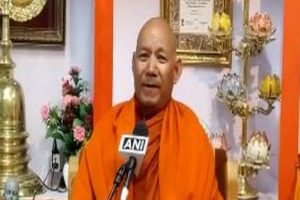Seventy-nine years ago, Mahatma Gandhi launched the Quit India movement that resulted in the British leaving India and India gaining independence. In a strange twist, once we gained independence, Indians started leaving India in droves ~ a trend that has continued till today.
The Indian diaspora is not headed to the West alone; name any country on the map ~ right from wartorn Syria to the tranquil island of Kailasa, you are sure to find Indians there.
A generation or two ago, the US was the favourite destination for Indian students, who went abroad feeling that there was no further scope for their studies in India. Students who went abroad were generally the crème-de-lacrème of Indian academe, like future Nobel Prize winners Hargobind Khorana and Amartya Sen.
Probably, the Government’s pathetic academic and scientific policies that frustrated Nobel Laureate Sir CV Raman to the extent that he smashed Nehru’s bust and the Bharat Ratna medallion to smithereens were to blame for the exodus of the brightest of the bright students from our shores. This migration was encouraged by foreign universities, working in tandem with foreign educational foundations, that offered generous scholarships to facilitate the flight of human capital from poor countries.
Contemporary media coined the term ‘brain drain’ for this exodus, questioning the patriotism of those going abroad, but there can be little doubt that had the top brains stayed back in India, they would not have reached the heights they did, resulting in personal loss, as well as a loss to mankind.
Facilities for attaining excellence were lacking in India, not in academics alone; even our sports coaching facilities were abysmal, prompting our leading sportsmen, in all disciplines, to go abroad for specialised training.
Coming to our much celebrated corporate sector, even after thirty years of liberalisation, the canvas of Indian business is not wide enough to accommodate the talent of persons like Sunder Pichai or Satya Nadella. Compared to the brain drain of the last century, motivation for the recent movement of Indians to foreign shores is totally different.
With national boundaries losing much of their inflexibility, many people in humdrum professions go abroad for a better livelihood.
Then there are a large number of businessmen, more than 7,000 per year, who take up residence in foreign countries for tax purposes.
The Finance Ministry found the emigration of High Net-worth Individuals so alarming that it set up a committee to study this phenomenon. However, what should worry us more are the large numbers of seemingly well-adjusted and well-placed citizens who want to emigrate. Some of these persons may want to go abroad for the creature comforts available in Western countries, but there are many who find themselves at odds with the way things move in India.
Some young relatives I talked to found Government processes particularly demeaning; they did not relish the idea of appearing as supplicants before Government officials for routine things, say a passport. Some others were dissatisfied with the way everything became easy for people with influence or money. Still others found castebased reservation in college admissions and Government jobs iniquitous. Such feelings of dissatisfaction are not confined to the younger generation alone; many parents do not wish that their children should remain in India.
Right from childhood such parents chart their children’s educational path in a way that they would get admission in foreign colleges and settle down there. These parents, who are generally well-placed and well-off, exude the air of having suffered a lifetime in India and justify sending their children abroad so that their offspring do not suffer in ways that they themselves did.
Probably, a debureaucratisation of society and a rationalisation of government processes is long overdue so that decent and self-respecting Indians do not feel frustrated with the Government and society. Some years ago, foreign corporations had transferred their back-office operations to India and giant BPO offices had come up in many cities, particularly Gurugram.
Everyone had welcomed BPOs because they provided well-paying jobs to unemployed youth. Over the years, helped by US visa restrictions in the Trump era and lockdowns and movement restrictions thereafter, the trend of foreign employers hiring Indians to work on their projects from workplaces in India has become more pronounced.
The present work from home culture and seamless internet connectivity has resulted in many highly qualified persons ~ in cutting edge fields like industrial design and artificial intelligence ~ working for their foreign bosses, from the comfort of their Indian homes or offices.
The situation is win-win for both, foreign employers get the best manpower at low prices, and Indian employees escape the hassle of relocation.
On the other hand, the focus of Indian corporates on profits and their reluctance to try out new technologies or new ideas ensures that Indians specialising in the frontier fields of technology find few employers in India, leaving the field open for foreign corporates to benefit from Indian brainpower.
Also, emerging Indian companies in the STEM sector are often purchased by bigger foreign players, inhibiting the development of the indigenous technology sector.
Due to the paucity of innovative technology our defence production industry was unable to develop a gun for the armed forces.
The development of an indigenous fighter aircraft has taken decades and even then, we had to import vital components, like the plane engine. Our pharmaceutical and medical equipment industry failed us at the time of both waves of the Covid-19 pandemic and we had to approach the international community, including arch rival China, for help. Such cluelessness is strange, given the fact that Indians head many of the largest corporations in the USA, that use cutting edge technology to manufacture stateof-the-art products.
We can retain talent in India, only if we have a vibrant education sector that can satisfy the curiosity of the most brilliant young minds and an industrial sector that can utilise the services of those minds. Making a beginning, in 2018, the Government selected six Institutes of Eminence that displayed the potential of being ranked among the top 500 educational institutes in the world.
Institutes of Eminence were to receive funds of Rs.1000 crore over the next five years for their development and also enjoy full autonomy in their academic functioning e.g., Institutes of Eminence could start new courses, admit foreign students, hire foreign faculty, and collaborate with foreign educational institutions, sans government approval.
The Government’s selection of Institutes of Eminence soon ran into controversy when it was revealed that Jio Institute that was yet to be set up, was one of the awardees (Jio Institute is yet to admit students). Later on, three of the awardees, IIT-Delhi, IIT-Bombay and IISc-Bengaluru complained about slow disbursal of funds.
It transpired that till November 2019, IIT-Delhi had received approximately Rs 93 crore, against its demand for Rs 200 crore; IISc had received about Rs.78 crore against its requirement of Rs.167 crore and IITBombay had got a mere Rs.43 crore. The UGC had also identified 12 universities as Centres of Excellence and granted a sum of Rs.5 crore to each. Various States, like Gujarat, have also identified some leading educational institutions as centres of excellence and granted them functional autonomy. Recognising the need for excellence in education is a welcome first step, though funding needs to be more widespread to benefit a larger number of students.
Moreover, education in the field of liberal arts also needs to be encouraged.
However, investment in education at 3.1 per cent of the GDP is far below the optimal figure of 6 per cent of the GDP. The gap in funding can be met by corporate support, which can be facilitated by designating industrial and scientific research as a CSR activity. Also, more talented students would opt for research, if the Government’s research setup is revamped.
The present vision of Atmanirbhar Bharat that would have us manufacture cheap copies of Western products is not too promising; the future lies elsewhere. For example, all Apple products were manufactured exclusively in China, yet Chinese manufacturers got only 4 per cent of Apple’s global profits.
The world’s most valuable corporates like Microsoft, Google and Facebook are based on ideas; the future path for us is the manufacture of knowledge based high technology products, for which we have the twin advantages of a well qualified workforce and a large local market. Moreover, if we create enough opportunities in knowledge intensive fields, our top brains would not need to go abroad to enrich Western economies.










